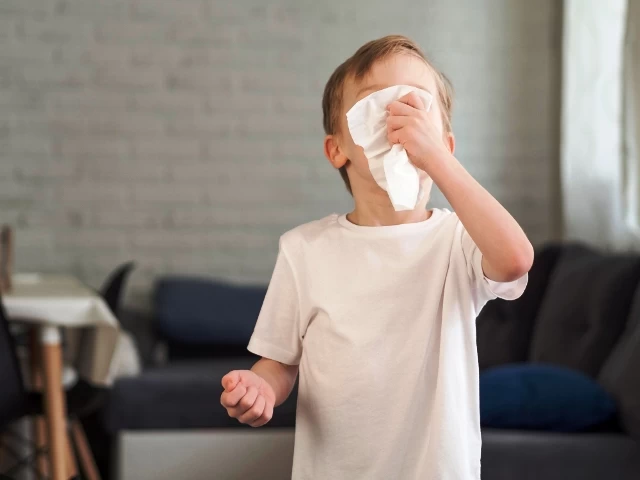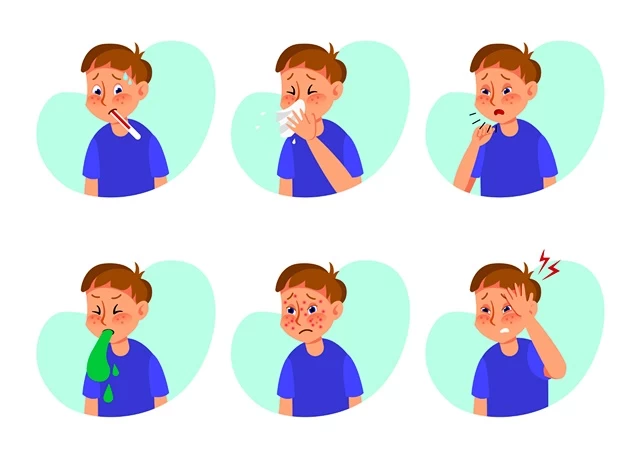
Respiratory Allergies in Children: 9 Questions
- Respiratory Allergies in Children: 9 Questions
- 1.What is the reason for the increase in allergic diseases?
- 2.With the current pandemic and seasonal factors, common colds and infections are also quite frequent. When should we consider allergies? Is it a common cold or allergic rhinitis?
- 3.When should we consider allergies in the case of coughing?
- 4.Children often get sick very frequently in their first year of kindergarten. What recommendations do you have for these children?
- 5.How do you diagnose allergies?
- 6.Pregnancy to prevent allergies in the newborn?
- 7.Is COVID-19 infection a risk for allergic children?
- 8.Is inhalation therapy or medication through nebulizers recommended for every child?
- 9.Is there a permanent treatment method that can completely end the allergic process?
1.What is the reason for the increase in allergic diseases?
There are several reasons for the widespread prevalence of allergic diseases. Allergy occurs when the immune system overreacts to proteins that it would normally not respond to. Given that we are increasingly moving away from a healthy and natural lifestyle, it is not surprising that the immune system tends to overreact. Factors such as migration from rural to urban areas, unhealthy and processed foods, air pollution, stressful lifestyles, and the increasing use of chemical-based products are just a few contributors to the rise in allergic diseases.
2.With the current pandemic and seasonal factors, common colds and infections are also quite frequent. When should we consider allergies? Is it a common cold or allergic rhinitis?
With the current pandemic and seasonal factors, common colds and infections have become quite common. However, there are certain clues to help determine when to consider allergies. Signs that indicate a possible infection include:
- Fatigue and malaise
- Fever
- Muscle aches
- Severe sore throat These symptoms are important factors that may suggest an infection.
On the other hand, the following symptoms should be considered for allergic rhinitis:
- Prolonged nasal congestion
- Repeated bouts of sneezing
- Clear nasal discharge accompanied by nasal itching
- Watery and itchy eyes These symptoms are significant indicators of allergies.
Nevertheless, it is important to remember that a definitive evaluation should be carried out by a medical professional. The doctor's examination and assessment are the most accurate way to determine the cause.
3.When should we consider allergies in the case of coughing?
Symptoms that should lead us to consider allergies in the case of coughing are:
- Prolonged coughing
- Coughing more frequently at night compared to the daytime
- Coughing that worsens with activities such as exercise, crying, or laughing
- Additionally, if the cough is accompanied by prolonged nasal congestion, itching, and recurrent sneezing, allergies should be taken into account.
Nevertheless, consulting a specialist physician for a definite diagnosis and evaluation is crucial.
4.Children often get sick very frequently in their first year of kindergarten. What recommendations do you have for these children?
In children attending kindergarten, ensuring a natural and balanced diet is crucial. Sufficient sleep duration and quality should also be ensured. When children venture outside for the first time and enter crowded environments, their immune systems encounter numerous infectious agents. In such cases, the immune system is expected to combat diseases more intensely than usual. However, some children may have allergic genetic predispositions or immune deficiencies, making this process more challenging for them. Therefore, evaluating them for allergic diseases and immune system health is important.
Children with the following conditions should be especially considered:
- Children who frequently require antibiotics
- Children who cannot recover from a cold without prolonged coughing
- Children with lower respiratory tract issues
- Children who have regular school absences due to illness Providing necessary preventive treatments for children in the appropriate patient group can help reduce the need for frequent antibiotic use and improve the unhealthy course of their school life.

5.How do you diagnose allergies?
Firstly, the patient's medical history contains valuable information. During the examination, nasal and lung findings can provide insights into the diagnosis. Allergy skin tests rapidly reveal the triggers associated with allergies. These tests can provide information on potential triggers such as house dust mites, pollen, cat or dog dander, and mold. Respiratory function tests provide information about lung capacity and can assist in diagnosing conditions such as asthma. However, these tests can only be performed on patients in the appropriate age group.
6.Pregnancy to prevent allergies in the newborn?
Although several studies have been conducted on this subject, there is no definitive information or recommendation to completely prevent allergies during pregnancy. However, the following suggestions can be given to maintain a healthy pregnancy:
- Avoiding stress: It is important to reduce stress during pregnancy. Stress can have negative effects on pregnancy, so the expectant mother should try to avoid stress as much as possible and use relaxation techniques.
- Preferring vaginal delivery: Whenever possible, vaginal delivery is recommended. Vaginal delivery can help the baby acquire beneficial bacteria that can support their natural immune system.
- Balanced and natural nutrition: It is important to maintain a balanced and healthy diet throughout pregnancy. The expectant mother should choose natural and nutritious foods, which support her own health as well as the healthy development of the baby.
- Avoiding alcohol and smoking: Alcohol and tobacco consumption during pregnancy can have harmful effects on the health of both the mother and the baby. Therefore, it is essential to completely avoid alcohol and smoking during pregnancy.
These suggestions are generally applicable to support a healthy pregnancy. However, each pregnancy is different, and it is important for every expectant mother to consult a healthcare professional considering her specific situation.
7.Is COVID-19 infection a risk for allergic children?
In addition to COVID-19, other respiratory infections can also cause coughing attacks in children with allergic asthma. In such cases, it is important for a patient with allergic asthma to continue the protective treatment recommended by their doctor without interruption. Data obtained so far indicate that the majority of asthma patients recover from COVID-19 infection similar to healthy individuals. Therefore, it is important for individuals with allergic asthma to maintain their health condition by adhering to their regular treatment plans.
8.Is inhalation therapy or medication through nebulizers recommended for every child?
In preschool children, viral infections can cause wheezing and coughing attacks, which may require treatment. However, in most children, these symptoms decrease as they grow, and the need for such treatments diminishes. Therefore, these conditions do not necessarily indicate asthma in every child, and the necessity for treatment can vary individually.
9.Is there a permanent treatment method that can completely end the allergic process?
Currently, the medications used in allergy treatment are important for maintaining a healthy lifestyle. However, to completely eliminate allergic reactions, allergen-specific immunotherapy (allergy shots) is required. This treatment is an option that should be considered in specific patient groups, decided by the physician and the patient together






